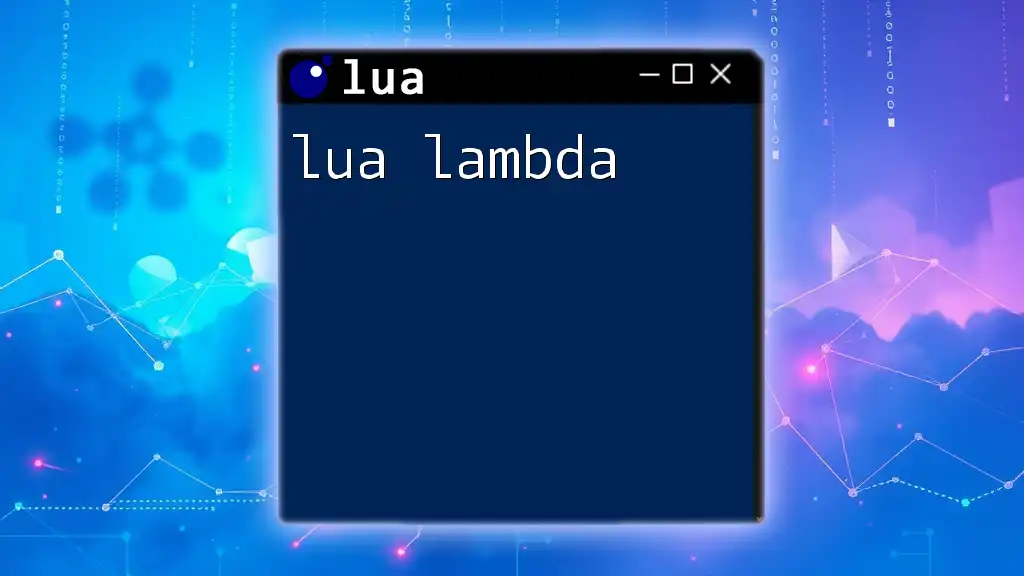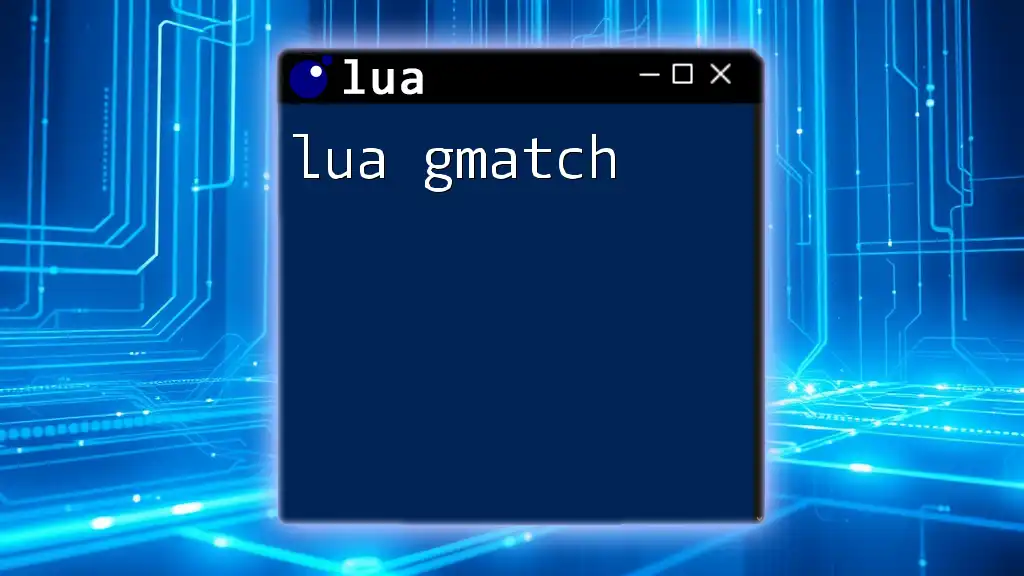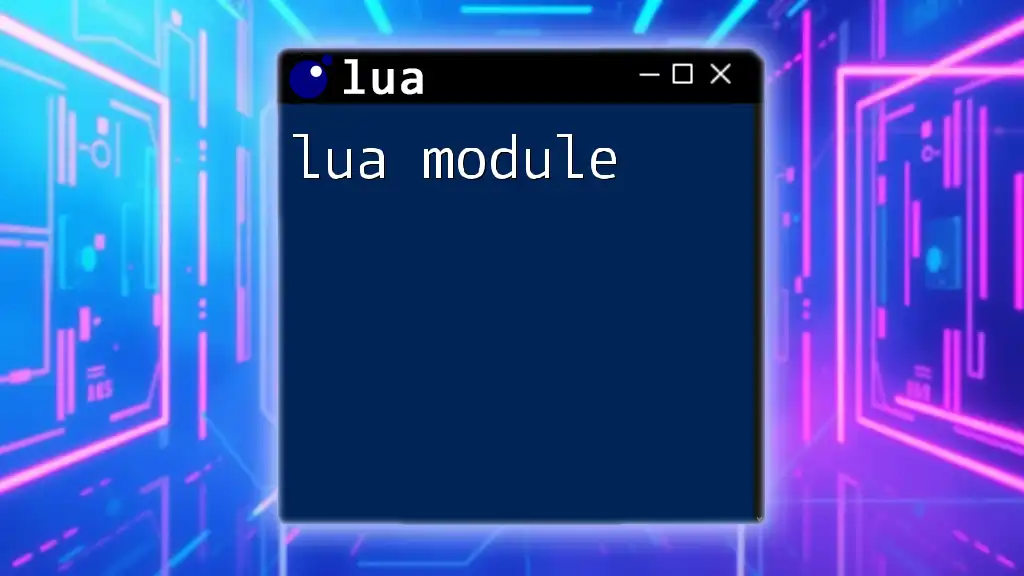In Lua, a lambda function is an anonymous function that can be defined in a concise manner, often used as an argument to higher-order functions.
Here’s an example of a Lua lambda function:
sum = function(a, b) return a + b end
result = (function(a, b) return a + b end)(5, 3)
print(result) -- Output: 8
What is a Lua Lambda Function?
A lua lambda function, often referred to simply as a lambda, is an anonymous function that can be defined inline. This means it can be created without being bound to an identifier, allowing for more streamlined and concise code expression. In Lua, lambda functions are fundamental because they embody the ideals of flexibility and efficiency, making them prevalent in many programming paradigms.
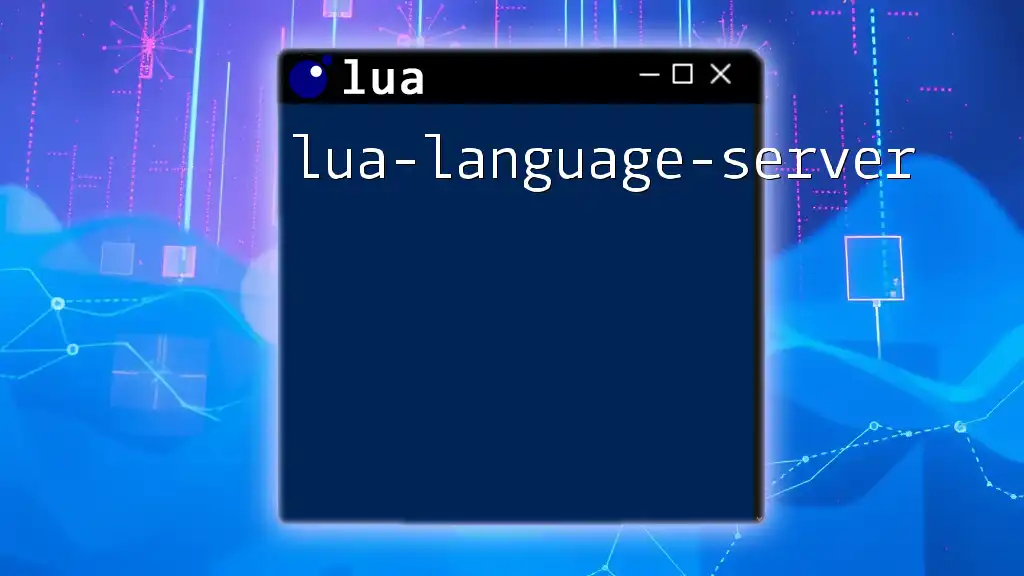
Syntax of Lua Lambda Functions
Basic Structure
The basic structure of a lua lambda function follows a straightforward syntax:
local functionName = function(parameters)
-- body of the function
end
Here’s a simple example of using this syntax in action:
local square = function(x)
return x * x
end
Using Anonymous Functions
Anonymous functions are key to understanding lua lambda functions. These functions allow you to define functionality on the fly without needing to formally name them. For instance, consider the following code snippet that demonstrates an anonymous function used directly:
local result = (function(x) return x + 5 end)(10)
print(result) -- Outputs: 15
In this example, the anonymous function is executed immediately with an input of `10`, showcasing the flexibility of lua lambdas for quick and concise computations.

Scope and Closures
One of the compelling features of lua lambda functions is their ability to capture variables and maintain scope through closures.
Understanding Variable Scope
In Lua, functions have access to variables defined in their enclosing scope, which is particularly beneficial for creating functions that remember state. For example:
function makeMultiplier(factor)
return function(x)
return x * factor
end
end
local double = makeMultiplier(2)
print(double(3)) -- Outputs: 6
In this case, the lambda function created within `makeMultiplier` retains access to the variable `factor`, demonstrating how closures work in lua. This allows for powerful abstractions and keeps the code modular and organized.

Practical Applications of Lua Lambda Functions
Simplifying Code with Lambda Functions
Lua lambda functions are particularly useful for keeping code succinct, especially when dealing with operations that require short-lived functionality.
Inline Function Usage
Consider a scenario where you want to transform a list of numbers. Using a lambda function inline reduces overhead while enhancing readability:
local numbers = {1, 2, 3, 4}
local doubled = {}
for i, v in ipairs(numbers) do
doubled[i] = (function(x) return x * 2 end)(v)
end
print(table.concat(doubled, ", ")) -- Outputs: 2, 4, 6, 8
This approach eliminates the need for a separate function declaration, thereby keeping your code cleaner and more focused.
Higher-Order Functions and Lambda
Higher-order functions are those that can accept other functions as arguments or return them as results.
Combining Functions with Lambda
Lua lambda functions enhance the use of these higher-order functions. For instance, using a lambda with a sorting function can make code more legible and maintainable:
local numbers = {3, 1, 4, 2}
table.sort(numbers, function(a, b) return a > b end)
print(table.concat(numbers, ", ")) -- Outputs: 4, 3, 2, 1
Here, the lambda function acts as the comparison function, providing a clear and efficient way to customize sorting behavior.

Performance Considerations
Efficiency of Lua Lambda Functions
When it comes to performance, lua lambdas are generally fast and efficient.
Execution Speed
The execution speed of lambda functions can be comparable to traditional functions but allows for tighter scoping and fewer repetitive declarations, which can lead to improvements in assembly language optimization.
Consider a simple benchmarking example that shows their performance:
function benchmark()
local timer = os.clock()
for i = 1, 100000 do
local f = function(x) return x * x end
f(i)
end
print("Elapsed time: " .. os.clock() - timer .. " seconds")
end
benchmark()
In a scenario where performance matters, using lambda functions can save both time and effort due to their concise nature.
Memory Management
Lua uses a garbage collection mechanism to handle memory automatically.
Garbage Collection and Lambdas
Using lambda functions can influence memory allocation due to their anonymous nature. For example, they may become eligible for garbage collection more quickly than regular functions, which could lead to lower memory usage in certain contexts. Here’s how memory impacts your lambda function:
local bigDataProcessor = function(data)
return function()
print("Processing " .. #data .. " items")
end
end
local processor = bigDataProcessor({"item1", "item2", "item3"})
processor()
This lambda will only exist as long as the parent function `bigDataProcessor` keeps it alive, demonstrating efficient use of memory in your lua program.
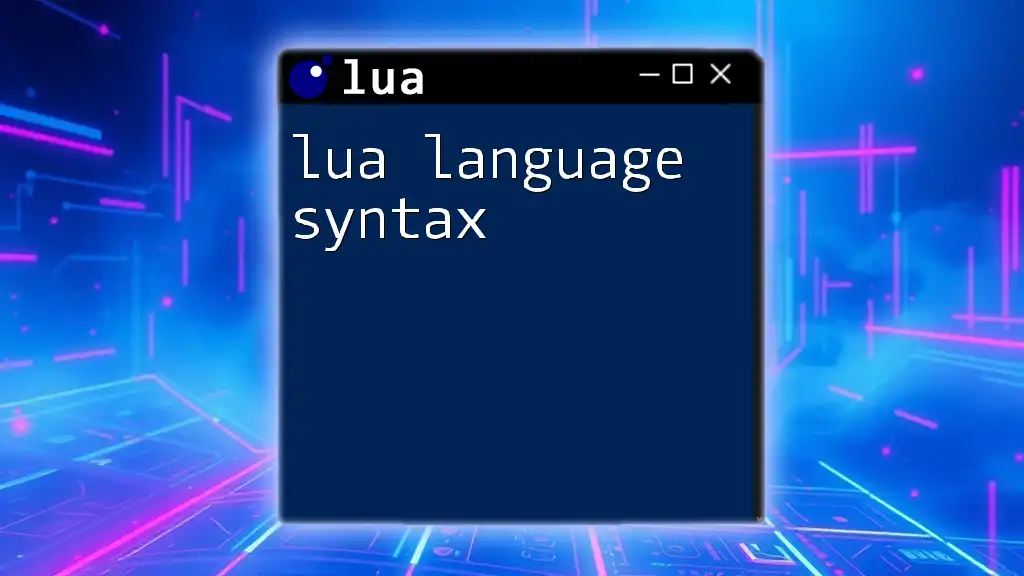
Best Practices for Using Lua Lambda Functions
Writing Clean and Maintainable Code
Incorporating lua lambda functions into your code can improve cleanliness and maintainability.
Code Readability
Readability is key. When using lambda functions, ensure the code is still understandable. Avoid overly complex expressions that could confuse other developers or your future self. Strive for simplicity by keeping functions concise and self-contained.
Avoiding Common Pitfalls
Despite their benefits, there are some common mistakes to be aware of when working with lua lambdas.
Common Mistakes
- Scope Issues: Be mindful of how local and global variables behave within lambdas, as accessing unintended scopes can lead to bugs.
- Overuse: While lambdas are powerful, using them excessively can detract from readability. Use them when they genuinely improve clarity and intent.
Best practices include clear inline documentation and maintaining a balance between using lambdas and traditional function definitions to achieve the best readability and functionality.

Conclusion
Lua lambda functions are a powerful feature that encourages brevity, efficiency, and versatility in coding. By employing these practices and understanding their implications, you can unlock a more expressive and dynamic coding style in Lua.

Additional Resources
For those looking to deepen their understanding of lua lambdas, refer to the official Lua documentation and explore online tutorials. Becoming part of Lua programming communities can also aid in your learning journey, allowing you to exchange ideas and solutions with other users.

